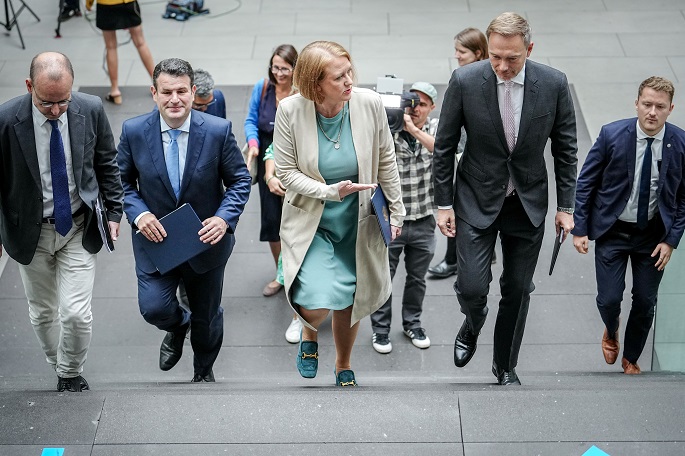German govt agrees on multi-billion-euro child benefit plan
Published : 28 Aug 2023, 21:56

Germany's coalition government has reached an agreement on a multi-billion-euro social benefit plan for families, bundling together previously separate child benefits, government sources told dpa overnight.
The plan, which aims to combat child poverty, was one of the major sticking points in the governing coalition of Chancellor Olaf Scholz's Social Democrats (SPD), the Greens and the Free Democrats (FDP).
Vice Chancellor Robert Habeck spoke of a "major, significant step" that will help many children "out of the poverty trap."
The agreement, reached after months of discussions, helped ease some coalition tensions ahead of a cabinet meeting in Schloss Meseberg outside of Berlin on Tuesday.
Family Minister Lisa Paus of the Greens, who introduced the proposal, said the negotiations were "really, really hard" but worth it.
"Up to 5.6 million families at risk of poverty and their children will get benefits faster, more easily and more directly as a result," Paus said. Among them are millions who previously did not know they were entitled to them, she added.
The additional cost to the government of the plan is estimated to be around €2.4 billion in its first planned year in 2025, according to the text of the coalition agreement seen by dpa.
If the demand for the benefits increases, the costs could rise to up to €6 billion in the following years, government sources said.
The Greens and the FDP have argued for months about the financing and finally reached an agreement on Sunday night.
Family Minister Paus had initially foreseen an annual €12 billion for the policy but later reduced this to €7 billion.
Finance Minister Lindner wanted a lower sum and had talked about allocating just €2 billion.
The finance minister said the plan is likely to be the last major social reform to fit into the budget for the next several years.
Lindner added the reform would make a difference for many thousands of families, however, he said it must "not be an incentive to not seek gainful employment, integration and language skills."
In their coalition agreement, the SPD, the Greens and the FDP had agreed to introduce a comprehensive plan that would bundle previous child benefit measures.
By providing a better overview and central platform to apply for the benefits, the government aims to reach families who have not yet received the money to which they are entitled.
"In future, there will be only one point of contact for all child benefits," the agreement states.
Meanwhile, child protection organizations are dissatisfied with the agreement.
Sabine Andresen, President of the Child Protection Association, welcomed the fact that the entitlement to the child supplement for working parents would be automatically checked in the future.
"Beyond that, however, the concept remains despondent and does not make the hoped-for contribution to combating child poverty," she said.
The German Children's Fund also said the agreement fell short of expectations.
It indeed represents a step forward, said the president of the organization, Thomas Krüger, but it is "not the big hit we had hoped for that would eliminate child poverty in Germany comprehensively and sustainably."
The opposition far-left Die Linke party said that €2.4 billion is not enough to combat child poverty in a meaningful way.
"This agreement may be good for the family minister, but for millions of families, it is a slap in the face," parliamentary group leader Dietmar Bartsch said.

